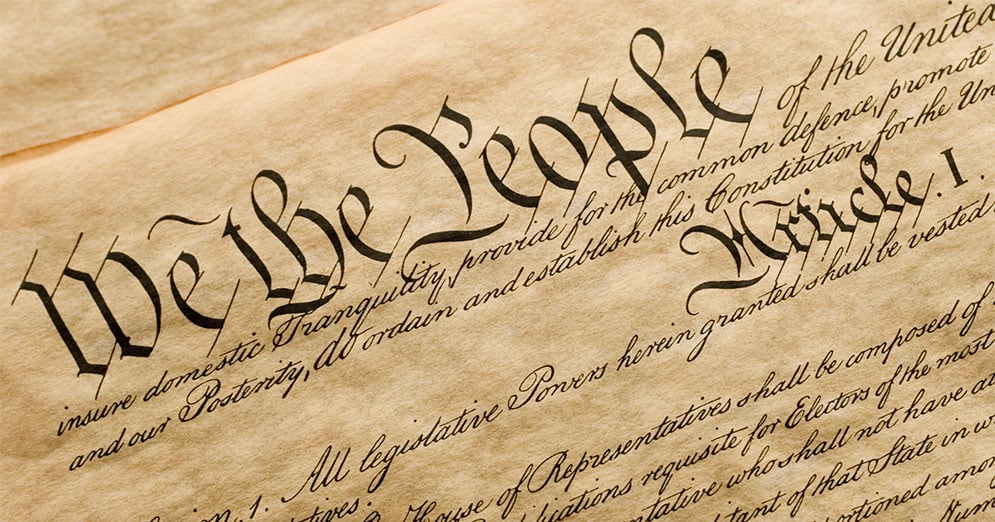Thousands of cryptocurrency fans collectively pooled their money last month to make a bid on a rare original printing of the US Constitution. The group, calling themselves ConstitutionDAO, brought $41 million to Sotheby’s November 18th auction for this rare and historic document (one of only 13 known to exist) but fell short of the winning bid of $43.2 million, losing out to billionaire hedge fund manager and Citadel LLC CEO Ken Griffin. Griffin, a known collector, especially in the art world, intends to lend the piece to a free Arkansas art museum.
The story behind the forming of ConstitutionDAO (DAO stands for “decentralized autonomous organization”) is an interesting example of something you will be reading more about in the coming year. DAOs are essentially a virtual co-op that governs itself using votes tallied through blockchain technology. Someone wishing to join a DAO pays for a token; the more tokens you own, the more votes you get. In the case of ConstitutionDAO, $4,000 in Ether purchased 1 million tokens.
Ether (Ethereum) is the world’s second-largest virtual currency by market capitalization as of 2021, second only to Bitcoin (BTC), which has been getting a lot of press recently in the high-end art and sports memorabilia world. The difference between the two, according to investopedia.com, is that “Bitcoin is primarily designed to be an alternative to traditional currencies and hence a medium of exchange and store of value, whereas Ethereum is a programmable blockchain that finds application in numerous areas, including DeFi, smart contracts, and NFTs.”
Do I know what all that means? No, not even after doing a little research; however, what I do know is DAOs, like fractional ownership and cryptocurrency, are emerging as market disruptors, democratizing the high-end auction market by providing small investors an affordable investment opportunity in non-traditional, high-value assets.
According to Austin Cain, 25, a financial adviser in Atlanta who helped to organize ConstitutionDAO, the group was formed with the goal to “purchase the Constitution of the United States in a way that utilizes the capabilities of the technology we all believe in.” Its plan was to publicly display the Constitution, one of 500 copies in a first printing, for free at an institution willing to cover the costs of housing the document dating back to 1787.
Roughly 30 volunteer “core contributors,” which included entrepreneurs, investors, developers, and at least two teenagers – none of whom were experienced collectors of historical artifacts – had devised a plan to participate in the auction: they put up a website, formed subgroups to research the various legal and financial wrinkles associated with the auction, and opened a Discord server to manage the transactions. Discord servers are dedicated servers made by specific communities and friend groups.
“Decentralization and cryptocurrency (web3) have created structures that allow people to self-govern with unparalleled levels of autonomy and freedom,” the group’s website reads. “It’s fitting that we use this technology to honor and protect the greatest historical tool for human governance: the U.S. Constitution.” This was, essentially, a bid ‘of the people,’ ‘for the people.’
ConstitutionDAO’s mission went viral. Within 24 hours of going live, ConstitutionDAO, described by the press as a financial flash mob, raised $4.5 million worth of Ether, swelling to more than 17,000 members heading into the auction with pooled resources in excess of $40 million. According to the group, the average investment was $206.26. Although the group disbanded in the week after losing the auction, and participants were reimbursed their investment less the Group’s expenses (transfer fees in the conversion of Ether to dollars and then back again to Ether), the experiment was not a failure and has opened the door for more such crowdfunding and fractional-ownership endeavors. According to a December 1, 2021 article in Forbes magazine, it has also opened the door to legal questions and speculative trading.
For one thing, DAOs and cryptocurrency live in a murky area with little regulatory oversight. For another, cryptocurrency remains a financial frontier land, which offers investors very little legal recourse and a roller coaster of a ride that disrupts, and can artificially inflate and potentially crash markets. Yet it is obvious that many find the thrill and upside worth the investment.
“That’s the beauty of this technology. It’s messy, it can appear chaotic. But those are features, not bugs,” Yossi Hosson, co-founder and CEO of Metaversal, was quoted as saying in the Forbes article. Hosson, whose firm collects and invests in blockchain companies and crypto-assets, put $1 million into Constitution DAO. It was to him and the others involved in this DAO group, a win-win investment opportunity: ConstitutionDAO took its best shot to purchase one of the most iconic and valuable of American historical documents, and falling short, gave investors their money back.
ConstitutionDAO showcases the financial potential of collective organizing online and the use of cryptocurrency as a form of exchange. In this case, more than 17,000 investors contributed varying amounts to raise more than $40 million, all online, to give a seasoned, wealthy individual a run for his money at one of the most prestigious auction houses in the world. This may have been the first time a DAO bid at Sotheby’s, but I would venture to say it will not be the last.





Related posts: